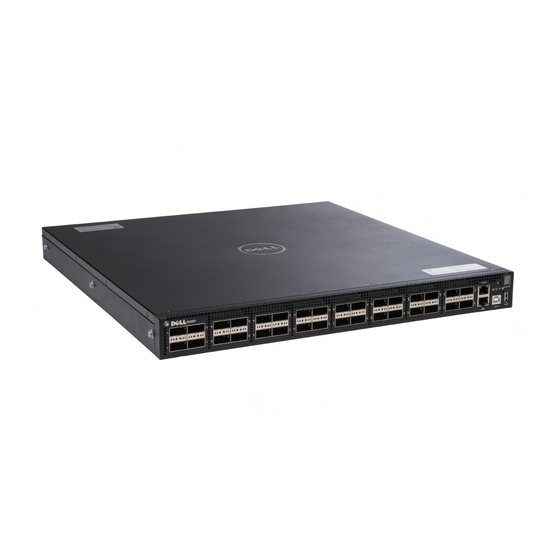- ページ 32
スイッチ Dell S6000-ONのPDF インストレーション・マニュアルをオンラインで閲覧またはダウンロードできます。Dell S6000-ON 41 ページ。 Open networking
Dell S6000-ON にも: スタートマニュアル (26 ページ), トラブルシューティングマニュアル (29 ページ)

2—USB-A Port
NOTE:
Before starting this procedure, be sure that you have a terminal emulation program already installed on your PC. You need
to install the appropriate drivers to support the USB-B port. For assistance, contact Dell Networking Technical Support.
1
Power on the PC.
2
Connect the USB-A end of cable into an available USB port on the PC.
3
Connect the USB-B end of cable into the USB-B console port on the S6000-ON.
4
Power on the S6000-ON.
5
Install the necessary USB device drivers.
You need an internet connection. For assistance, contact Dell Networking Technical Support.
6
Open your terminal software emulation program to access the S6000-ON.
7
Keep the default terminal settings on the S6000-ON console as follows:
•
115200 baud rate
•
No parity
•
8 data bits
•
1 stop bit
•
No flow control
Before you install an OS system
After powering on the S6000-ON system, it goes through a power-on self-test (POST).
POST runs every time the switch is initialized and checks hardware components to determine if the switch is fully operational before
booting. After POST, the system uses the Grub bootloader.
To select which entry is highlighted, use the up and down arrow keys. Press Enter to select an operating software-selected OS or enter e
to edit the commands before booting. Enter c for a command line. The highlighted entry executes automatically in the operating system.
Grub bootloader example
GNU GRUB
version 2.02~beta2+e4a1fe391
+------------------------------------------+
|*ONIE: Install OS
| ONIE: Rescue
| ONIE: Uninstall OS
| ONIE: Update ONIE
| ONIE: Embed ONIE
| ONIE: Diag ONIE
|
|
|
|
|
|
+------------------------------------------+
Your system comes with open networking installation environment (ONIE) installed.
ONIE example
ONIE: Install OS
For downloading and installing an OS from a URL
Starts ONIE with ONIE Discovery Service
(factory default boot)
32
Management ports
|
|
|
|
|
|
|
|
|
|
|
|
